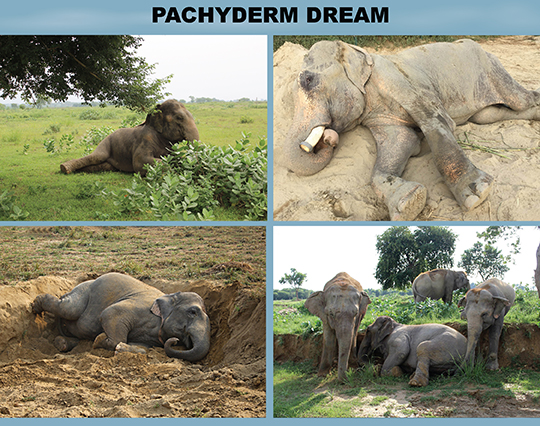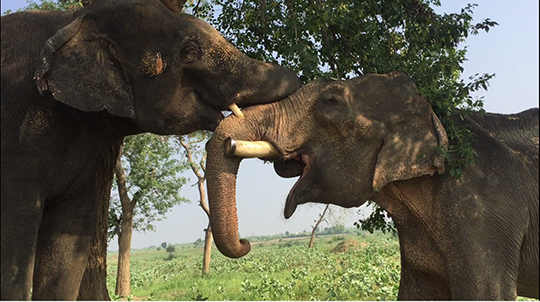Who could ever forget the scene in Dumbo when Dumbo's mother is chained up in a tiny train car and reaches her trunk through the bars to cradle her baby? It's perhaps one of the most heartbreaking moments of the film.
Dumbo's core message may be about finding self-confidence and success by embracing one's uniqueness, but it also exposes the horrifying cruelty of elephant captivity in America. So when Care2 member Teresa found out that Dumbo is turning 75 on October 23rd, she couldn't think of a better way to celebrate the film than by helping real life elephants in captivity.
The film's first scenes depict elephants stuffed into train cars way too small for them, forced to erect the big top in the pouring rain, and perform dangerous tricks for leering crowds. Dumbo's mother is labeled a "mad elephant" because she defends her baby against abuse by circus visitors, and then lashes out when circus workers confront her with whips and bull hooks.
These scenes may have been inspired by the treatment of elephants in circuses during the 1940s when Dumbo was first released, but unfortunately not much has changed for elephants living in captivity today.
The Elephant Sanctuary in Tennessee is a highly regarded refuge for elephants that have been removed from their natural habitat, taken away from their families, and used like Dumbo and his mother for entertainment and public display. In fact, hundreds of thousands of Care2 members have signed recent petitions demanding the release of captive elephants Nosey, Asha, and Bamboo to the sanctuary.
A donation from Disney would help feed and house the sanctuary's current elephants, as well as allow them to provide a home for more elephants in need. So please sign Teresa's petition to ask The Walt Disney Company to honor their most beloved elephant by donating some of the film's 75th anniversary special edition DVD proceeds to The Elephant Sanctuary in Tennessee.
One of the first things rescued elephants do when they arrive at the sanctuary is find a grassy patch, then collapse and fall into a deep sleep. And it’s usually been a long time coming: When their legs are chained up, elephants rarely get to lie down and rest normally. When they can actually sleep, captive elephants usually don’t get soft earth to rest their weary bodies—instead they’re forced to somehow find comfort on hard concrete or stone. All of India’s elephants deserve the basic dignity of simply laying down to rest—without shackles, without chains, upon the soft earth that was meant for them. And though our rescue and care center provides exactly that, we are almost out of room. We desperately want to bring 50 more elephants freedom and peaceful rest, but to do it we have to expand.

Elephants and pangolins and sharks. Just
a few weeks ago, we were reeling from some terrible news: WCS helped publish two
major studies that showed Africa’s elephants were in worse shape than previously
known — poaching is so bad it will take forest elephants a century to recover
from rampant poaching of recent years.
Against
this grim backdrop, CITES CoP17 — a major international treaty conference on
wildlife trade — began, but wins for wildlife were not guaranteed. In fact, some
countries proposed rolling back key elephant protections.
You
could almost feel the world holding its breath: would government representatives
recognize this moment and step up for wildlife on the brink?
Because
people like you spoke out — over 129,867 people signed our petition supporting
closure of all domestic ivory markets — we can proudly answer: YES.
Your
support helped push ivory bans forward and made CITES CoP17 one of the most
productive ever — with effective, science-based decisions for
elephants, pangolins, sharks, African grey parrots, and other vulnerable
wildlife. That’s why we wanted to share this update with you today.
Your
letters, your donations, and your participation in this movement are essential
to victories like these and are helping to secure a future for
elephants and other wildlife that they might not otherwise have.
|

Update: Senate Bill 2508, aka "Nosey's Law," passed in the
New Jersey Senate on October 20 with a 32–5 vote! There are still many
hurdles to overcome in our work to help elephants used for entertainment, but
this is a major step forward. We'll continue to keep you posted on the bill's
progress, and we'll need your help in urging decisionmakers to support the bill
when the time comes.
Thank you to all who took action by asking your senator to support the bill. Next stop: the General Assembly!
Please take one more action to help Nosey: An Indiana festival that has exhibited her in the past did NOT include her in this year's events because she had been "double booked"—and the festival was still a success without her. Please contact the festival's organizers and ask them to make compassion the new tradition by ensuring that Nosey is never exploited under their watch again. Click to help!
Thank you to all who took action by asking your senator to support the bill. Next stop: the General Assembly!
Please take one more action to help Nosey: An Indiana festival that has exhibited her in the past did NOT include her in this year's events because she had been "double booked"—and the festival was still a success without her. Please contact the festival's organizers and ask them to make compassion the new tradition by ensuring that Nosey is never exploited under their watch again. Click to help!
South African Airways, Stop Transporting Ivory!
When Teresa visited Nyungwe Forest National Park in Rwanda a few weeks ago, she saw no elephants. She was told that so many of them had been poached for their tusks in recent years that there were almost none left in the entire park.
Every 15 minutes, an African elephant is killed for its tusks. That includes those being killed on legal trophy hunts. Unless we do something now to stop legal and illegal elephant hunting, we are in serious danger of losing one of the world's most majestic animals within a few decades.
Teresa was horrified when she found out that South African Airways still allows people to transport ivory and other hunting trophies on its flights. If hunters weren't allowed to take their trophies out of the country, many would not bother killing the animals at all.
In April 2015, South African Airways announced that it would no longer allow endangered animal trophies on its flights. The company stated that it wanted to preserve Africa's wildlife for future generations. But just three months later, the airline caved to pressure from the big game hunting industry and lifted its ban.
It is well-documented that trophy hunting has not provided the promised revenue either for conservation or for local African communities. The only people that the trophy hunting industry benefits are rich foreign hunters looking for a cheap thrill, the hunting companies' CEOs, and poachers.
By allowing foreign hunters to transport legally obtained elephant heads and tusks back to their home countries, South African Airways is also making it easier for poachers to sneak out illegally sourced tusks as well. The company has become complicit with the legal and illegal killing of tens of thousands of elephants each year.
To protect the estimated 400,000 elephants that still remain in Africa, we must stop poachers and shut down the international ivory trade. Cutting off one of the major ivory transportation routes out of Africa would be a huge blow to those making money from the slaughter of elephants.
Sign Teresa's petition to demand that South African Airways contribute to saving Africa’s remaining elephants by reinstating its ban on ivory transportation. The airline did the right thing once before; they can do it again. We just need to make our voices louder and stronger than those of the big game hunters.
Leo DiCaprio Fights for Elephants With New Documentary Coming to Netflix! The ivory trade is one of those issues that people instantly recognize when it is mentioned in conversation, but don’t often take the time to think about on their own. It’s understandable. Many of us grew up not necessarily knowing that acquiring ivory meant harming an animal. The word ivory did not conjure images of bloody elephants and raging tusk fires. Ivory meant the white keys on a piano, our cherished domino set, and fancy jewelry. However, the reality of the matter is that the ivory trade deserves our attention, and fast. At this point in time, elephant poaching is quite literally a crisis. It is estimated that almost 100 elephants are poached every single day, solely for their ivory tusks. And this cruel and violent movement isdriving the extinction of this incredible creature at an unprecedented rate.
There are several methods used by animal activists and conservationists to battle the cruel ivory trade. In addition to stopping poachers before they even reach the elephants (the ideal method), these groups also combat the illegal trade after the tusks have already been taken by burning them. Ivory burns take a large number of ivory tusks out of the trade’s circulation and shows poachers that the efforts they take to so brutally steal from elephants may very well end in vain. Activists also use powerful images and words to help people realize the gravity of this issue. And now, there is a new film coming out that aims to take the dark, underground world of the illegal ivory trade and illuminate it for all to see.
The film is called The Ivory Game and it will begin streaming on Netflix on November 4th, 2016. The film follows undercover intelligence organizations, activists, frontline rangers and conservations in their mission to overtake the corrupt global network of ivory trafficking. The documentary is produced by Leonardo DiCaprio, which is not too surprising considering all of the awareness (and money) Leo has already raised for the cause. Considering the success ofCowspiracy and Virunga, two other Leo-produced docs, we can’t wait to see the reaction to this latest film.
While people who stay up to date on the latest news of the ivory trade will certainly be delighted to see a documentary that highlights the intricacies of this horrific business, what will be even more impactful is all the people who hardly know about it. The fact that Leonardo DiCaprio’s name is attached to it can also help get this important message out to a much broader audience and help increase the impact of the film. We hope that this documentary is able to get people to start thinking about these critical issues in a whole new way. Goodness knows millions of lives depend on it.
Watch the trailer for The Ivory Game below:
Lead image source: Netflix US & Canada/YouTube
Plight of the Asian Elephants. The UK Prime Minister Mrs May is visiting India in
November. Please can you ask the Prime Minister to assist in the cause
of the Plight of the Asian Elephants.
To email Mrs May Prime Minister just follow this link:
https://email.number10.gov.uk/
PLEASE TAKE ACTION TODAY – if you would like to use this
text or similar it will take just 2 minutes of your time:
Dear Prime Minister
Following the visit to the UK of Mr Modi from India, Mr
Modi and (former Prime Minister) Mr Cameron issued a joint declaration, part
reading “They resolved to work together to combat the illegal wildlife trade and
to improve protection for both captive and wild Asian elephants. India endorsed
the London Declaration and Kasane Statement on Illegal Wildlife Trade.”
Furthermore the Conservative Party election pledge includes the specific pledge
to “support the Indian Government in its
efforts to protect the Asian elephant”.
Captive elephants in India are usually trained and
controlled by the use of pain and fear, with the use of the bullhook and other
weapons.
During your visit to India in November please will you
raise this issue with Mr Modi.
Please also consider the use of UK funding to assist the
Government of India to help genuine Elephant sanctuaries rescue abused
Elephants, and protect the Elephants forest habitats.
I hope you will support the cause of the Plight of the
Asian Elephants.
Yours faithfully
If you follow the link here and watch the two videos you will
see how Elephants used (called domestic or captive Elephants) are broken:
Capture from the wild
Baby Elephants are snatched from their forest homes. To
capture the baby Elephants the mothers and other herd members who attempt to
protect their young are killed.
Between 5 and 10 Elephants are estimated to be killed for
each baby Elephant captured.
Clearly at this point the Baby Elephants are traumatised, but
this is just the start.
The baby Elephants are then subject to Phajaan – The breaking
in process.
The baby Elephants are isolated then forced into a pen and
tied with ropes to prevent them moving. They are deprived of water, food and
sleep, beaten with rods, chains, bullhooks and stabbed with knives and nails.
Phajaan is designed to break their spirit and brutalise them into submission -
domestication. The beatings are so brutal that 50% or more die during this
process.
Once the spirit of the baby Elephant is broken, they are used
for various activities including tourism, logging, temples etc. Throughout their
lives, which for most can best be described as a hell on earth, they are
disciplined by the bullhook, from which the Elephants are now conditioned to be
terrified.
In India there are estimated to be 10,000 Elephants living
this fearful, brutal existence and just 20,000 left in the wild.

Garden Brothers Circus say ELEPHANT ACT WILL BE GONE BY THE END OF THE MONTH, ending their 100-year tradition of hosting elephant acts in a recent story citing changing laws and unfair treatment of animals as the motivation.
Garden Brothers leases their animal acts, often using elephants from Carson and Barnes Circus. ADI undercover investigators secured evidence of Carson and Barnes circus elephants used for children’s rides going out of control and fighting behind the scenes. See video here:http://bit.ly/2d9mjTa
Donate to keep ADI investigators in the field:http://bit.ly/29mIjIw
Garden Brothers leases their animal acts, often using elephants from Carson and Barnes Circus. ADI undercover investigators secured evidence of Carson and Barnes circus elephants used for children’s rides going out of control and fighting behind the scenes. See video here:http://bit.ly/2d9mjTa
Donate to keep ADI investigators in the field:http://bit.ly/29mIjIw
| Wanjala's Rescue |
| ||
Our Favorite Mohan Photo. Ever.
















